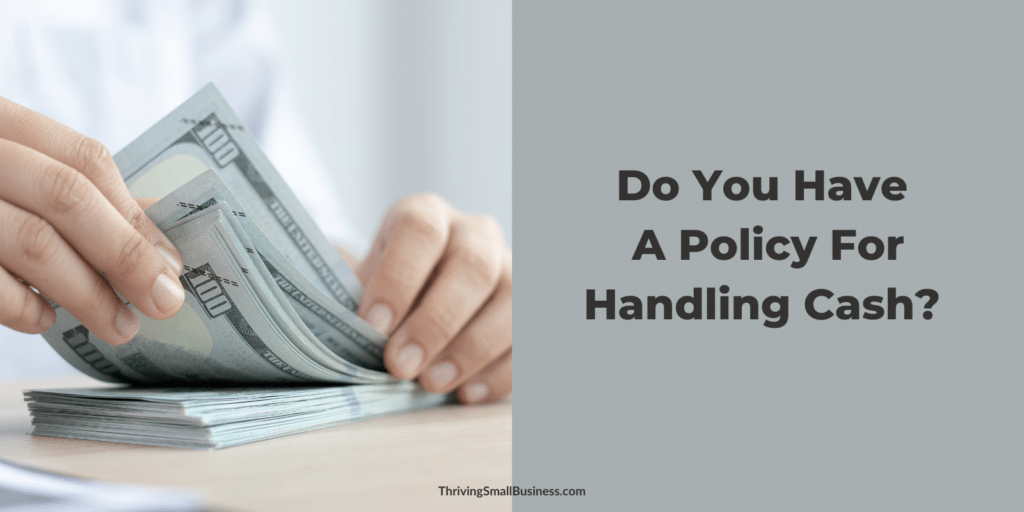Cash Handling Policy Example
Estimated reading time: 5 minutes
As they say, money makes the world go round. And, small businesses need money to operate – which is why a cash handling policy is so important.
We live in a digital age and not every business operates with cash, but many do.
If your organization handles cash, you should have clearly defined cash handling policies and procedures to help protect that money.
A cash handling policy can help protect an organization from fraud and embezzlement.
Is Cash Safe In Our Business?
We work with people we trust. And of course, cash is safe in our business. Well maybe not.
The fact is, cash is simply too tempting for many people – particularly people with financial needs.
This is a difficult fact to think about because of course no one would steal from us, but the reality is people do.
And, it is management’s responsibility to ensure that the organization safeguards its cash assets.
Why Do People Steal Cash From Businesses?
No one wants to hire someone who potentially steals from the organization. That is why good hiring screening and a background check will help to eliminate some would-be thieves.
However, research tells us that a good employee who is put in a bad situation may do something (steal) that they may have never even thought about.
The fact is that people with an incentive (a need), rationalization (I deserve this), and the right opportunity (easy access) are candidates for embezzling funds.
Good cash handling procedures can protect the organization, the employee, and prevent fraud in the workplace.
For instance, let’s say you have a diligent employee who was the last person to document the handling of cash. If some money were to come up missing, this person would have documentation showing that they were never alone with the cash. This could potentially save that person from a false accusation.
How Do You Handle Cash In A Business?
Every organization is different, and every organization has very specific needs when it comes to cash in the workplace.
The basic premise should be that cash is never handled by only one person and should be controlled until it is deposited into the bank.

Two-person policies ensure safe cash handling and eliminate the temptation to swipe a few dollars when no one is looking.
This is why it is important to have policies and procedures in place.
The following are some general guidelines and things to think about that can help you develop a cash-handling policy specific to your organization.
Use this example cash handling policy to ensure your cash is safeguarded.
Example Cash Handling Policy
Purpose: To ensure control and safekeeping of business cash assets.
Cash Handling Policy
- A safe should be used to store all cash. Even small amounts of cash (petty cash) and cash register drawers should be secured and under lock and key at all times.
- Safes should only be opened with two people present.
- The person with the combination of the safe should not be one of the people involved in handling the cash in the safe.
- Require that two people are present whenever cash is transported from one location to another.
- Provide a cash count sheet that documents the following:
– Names of people removing cash from safe
– Date/time cash is removed from safe
– Date/time cash is returned to the safe
– Cash breakdown – coins, bills, checks, credit card slips
– Two signature lines for people signing for the cash
- When cash bags are removed from the safe, they should be counted by two people, and both people should sign the cash count sheet acknowledging that the recorded amount of cash was in the bag.
- When cash is handed off to the next person, the person accepting the cash should count the cash before accepting it and keep the signed copy of the cash record with the cash.
- When cash is returned to the safe, it should again be double-counted, and the cash count sheet should be signed by both parties.
- Bank deposit slips should match the cash sheets.
Records should be kept on all cash-handling deposits.
These are very simplistic guidelines and should be expanded and adapted to your particular organization.
An editable copy of this document can be found by clicking here.
Other things to think about
as you build your cash handling policy:
- Where is the safe located?
For instance, ask yourself, is the safe out of public sight?
- Who has keys to the room the safe is in?
For instance, the person who has keys to the room that stores the safe should not be the same person who has the combination to the safe.
- Background checks should always be done on employees.
For instance, every employee should have a background check, and some organizations do credit checks to find out if there are financial issues with employees.
- Safe combinations should be changed whenever a person holding the combination leaves employment.
For instance, make a note in the termination checklist to change the safe combination when employees who have access to the safe leave.
- There should be a drop slot in the safe to allow for one-way access to the safe.
A drop slot will eliminate the need to unlock the safe every time there is a need to deposit a cash bag in the safe.
- There should be a camera monitoring all safes and cash registers.
Cameras are particularly important for those areas that are isolated and out of a manager’s sight.
Why Is A Cash Handling Policy Important?
Organizations lose billions of dollars each year from embezzlement in the workplace .
It is unfortunate but organizations that are victims of fraud and embezzlement neglect to do one thing. That one thing is oversight!
Management oversight ensures that the people and processes in your business are observed and controlled through policies.
Good policies and oversight of cash handling are one way to safeguard against theft.
What does your organization do to prevent embezzlement?






